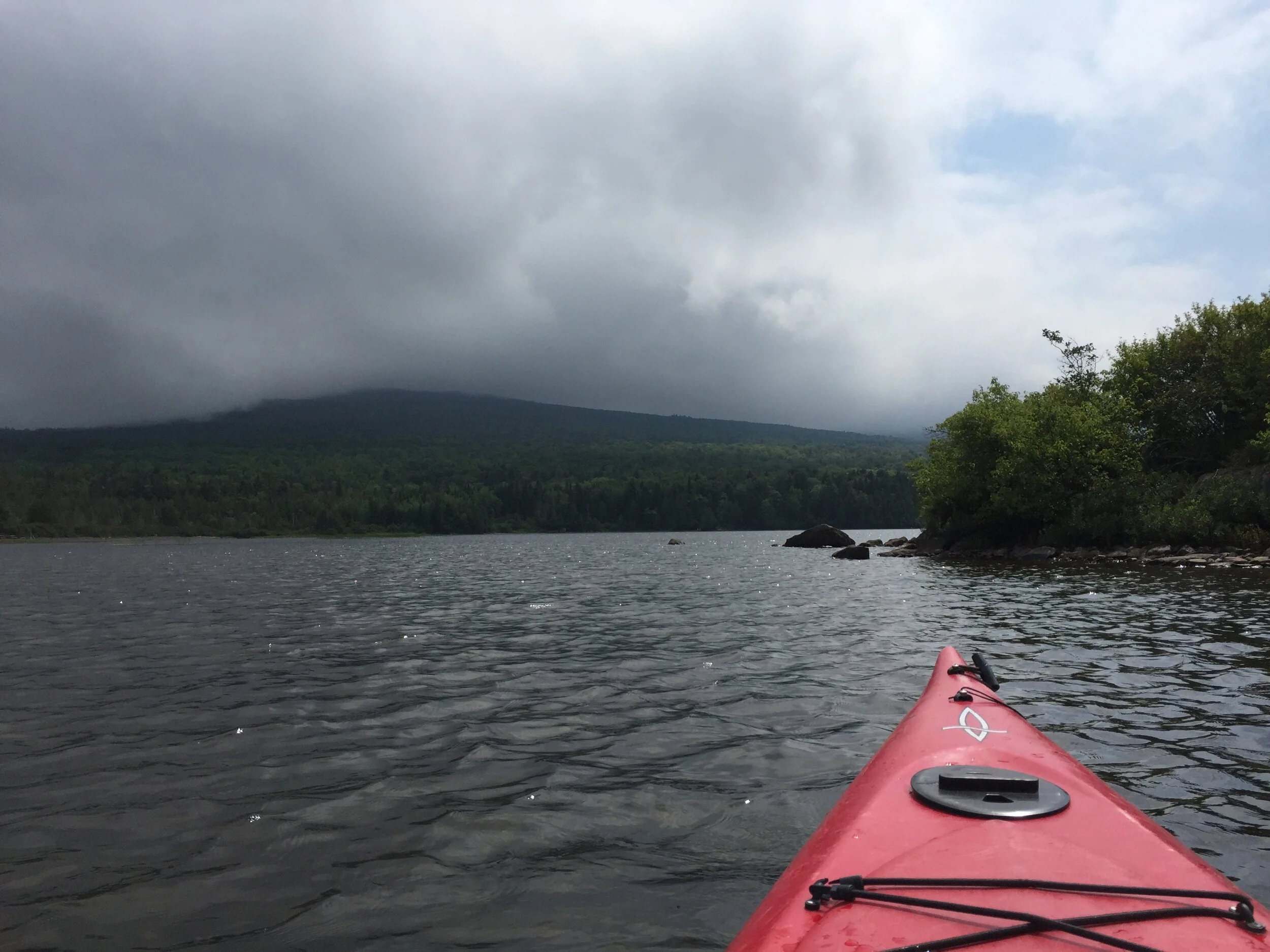The Maine Woods
The effects of climate change are all around us: extreme heat and cold weather; forest fires raging in the west; floods devastating crops and land in the Midwest; rising sea levels and storm surges taking lives in the south; shorter, more erratic winters here in the northeast. We must act.
Conservation is one of the many tools that can help alleviate the effects of a changing climate. Protected lands provide ecosystem services and natural resiliency, which is why nations around the world, including the U.S., are committed to the goal of conserving 30% of the planet’s land and waters by the year 2030.
Lying at the heart of the Northern Appalachian-Acadian Forest, the most intact, unfragmented ecoregion east of the Mississippi, Maine’s forest houses more than half of the largest globally important bird area in the United States. The cold waters of the area support the last stronghold of native wild Eastern Brook Trout in the U.S. The Western Maine Mountains are home to more than 139 rare plants and animals, including 21 globally rare species, and provide core habitat for marten, lynx, loon, and moose. Maine’s vast North Woods have a significant role to play in mitigating and adapting to a changing climate. Our 17.5 million acres of forest absorbs 60% of the state’s greenhouse gas emissions annually, while harboring a wide range of wildlife.[1] Unfragmented forests offer microclimates and habitat connectivity, and shelter cold waters, all of which add up to tremendous resilience in the face of change.
Katahdin Woods and Waters NM, Photo credit: National Park Service
But the circumstances that kept these forests intact for centuries are changing rapidly. Maine loses an estimated 10,000 acres of forestland each year. Development pressures have escalated because of the COVID-19 pandemic, notably in the more remote areas of the state. Keeping our iconic and hard-working forest intact is of the utmost importance, not only to slow climate change, but to the state’s economy and traditions as well.
The Forest Legacy Program (FLP), which was established in 1994, has helped conserve 755,000 acres of working forestland in Maine, using more than $76 million to conserve thirty-one parcels across the state ranging in size from 72 to over 300,000 acres. Since 2004, the FLP has been funded through the Land and Water Conservation Fund (LWCF).
Forest Legacy funds have played a vital role in the Appalachian Mountain Club’s (AMC) Maine Woods Initiative, in which we have conserved over 75,000 acres of Maine forestland. Situated in the 100-mile Wilderness area – named for the last leg and most remote section of the Appalachian Trail – the Maine Woods Initiative blends sustainable forestry, backcountry recreation, and environmental education to demonstrate a new model of land management.
The Forest Legacy Program gave this visionary project a critical boost at its inception, granting $4.43 million in 2005 toward the acquisition of the 37,000-acre Katahdin Ironworks parcel, the centerpiece of the Maine Woods Initiative. That purchase not only conserved working forest, but Little Lyford Lodge and Cabins, a famed fly-fishing destination, and access to Gulf Hagas, a deep slate gorge known as “the Grand Canyon of Maine.” In 2017, Forest Legacy funds contributed to the conservation of nearly 10,000 neighboring acres with the Gulf Hagas-Whitecap parcel.
Little Lyford Pond Photo credit: Jerry Monkman, courtesy of AMC
Not only has the Maine Woods Initiative provided climate benefits, but it has had a positive impact on the forestry and recreation economy, protected critical habitat, and provided environmental education opportunities as well. Overall, between 2003-2018, AMC’s Maine Woods Initiative contributed $42.6 million to Maine’s economy and $29.6 million to Piscataquis County, an important contribution to a rural area among the poorest in Maine and facing significant changes and challenges. AMC supplies local mills with 6,000-7,000 cords of wood per year, harvesting in a manner certified sustainable by the Forest Stewardship Council. AMC’s three backcountry lodges welcome an average of 10,000 visitors per year to ski, hike, bike, paddle, birdwatch, and enjoy nature. Most recently, the International Dark Sky Association designated our land holdings as an International Dark Sky Park, recognizing the quality of the nocturnal environment.
From our initial acquisition, the Maine Woods Initiative has nearly doubled in size, growing to encompass 27,000 acres of ecological reserves, 130 miles of recreational trails, and 12 wilderness campsites. The property supports three carbon sequestration contracts, both on land left in its natural state and on working timberlands. We have successfully connected 64 miles of tributaries to main stem rivers, restoring an enormous web of habitat for native species. Working with partners like Trout Unlimited and the Maine Department of Marine Resources, we are undertaking watershed-scale habitat restoration that has succeeded in returning the endangered Atlantic salmon to its historic waters in the West Branch of the Pleasant River for the first time in 180 years.
AMC’s outreach brings us into contact with each student in Piscataquis County four times over their educational career. These environmental education experiences are an essential component of AMC’s work and mission, cultivating the next generation of outdoor enthusiasts and stewards of our public lands.
AMC is proud of our work to keep a substantial contiguous portion of Maine forestland intact, support the local economy, provide good jobs, offer a range of recreation opportunities, return trout and salmon to their historic habitat, and preserve dark skies. We know first-hand what Forest Legacy funding can accomplish, and we wholeheartedly support a substantial increased investment in this effective program. Every year there are far more Forest Legacy projects submitted than can be funded at current levels, even after passage of the Great American Outdoors Act established dedicated funding for LWCF (of which FLP is one of ten different conservation tools).
Congress is currently considering ways to advance natural climate solutions in its budget reconciliation legislation and has proposed substantial additional investment in forest conservation including the Forest Legacy Program. Given what AMC has been able to accomplish using Forest Legacy, we urge Congress to retain these provisions in the final reconciliation bill to meet this urgent moment of climate crisis. We simply cannot afford to lose any opportunity to keep our forests as forests!
TAKE ACTION: Add your organization the LWCF Coalition’s current letter to Congress urging them to include the forestry provisions in the final reconciliation legislation.
Long Pond, Katahdin Ironworks. Photo credit: Kristin Murphy
To celebrate 2021 as the first year of full permanent funding for LWCF, we are hosting monthly spotlights that showcase the incredible work of LWCF Coalition partners using America’s most important conservation and recreation program. This month, our partners at the Appalachian Mountain Club shared their critically important work using LWCF to protect the Maine Woods.
[1] http://climatecouncil.maine.gov/future/sites/maine.gov.future/files/inline-files/MaineWontWait_December2020_printable_12.1.20.pdf



